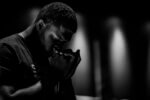“Trust in the Lord with all your heart, and lean not on your own understanding; in all your ways acknowledge Him, and He will direct your paths” (Prov. 3:5-6).
This verse is packed with truth, wisdom and challenge, and the challenge is real. We love to know where we are going and how we will get there.
Unsurety steals our confidence. Our Father reserves the right to lead us into situations that we don’t discern. God’s plans escape our awareness.
The old saints used to say, “Trust the Lord even though you cannot trace Him.” As humans, we rely on our feelings. However, feelings are not the best source to test our surroundings. We don’t always know where God is leading us.
We go out to dinner, and during the dining experience, we realize that the evening is not about dinner. We find ourselves in a divine assignment from heaven. During the assignment, we desperately seek to understand what God is doing. God desires that we lean into the assignment He has planned for us. As humans, we struggle with discerning what to do.
When we are not sure of what God is doing, we must trust His ways.
Trust God
To trust the Lord with all our heart is a command—no easy order for sure.
Trust is what we have when our faith is wavering. We tend to trust ourselves when we cannot trace God. Abraham could not trust how God would give him his firstborn child, so he trusted his wife, Sarah.
Abraham and Sarah waited twenty-five years for their son to be born because it is “through faith and patience [we] inherit the promises” (Heb. 6:12; see also 10:36).
When God had called Abraham, He promised to make of him a great nation that would bless the whole world (Gen. 12:1-3). God also promised Abraham to be the father and Sarah (not Hagar) the mother (Genesis 17:19; 18:9–15). Sarah did not believe that God was working fast enough to give them their son, so she decided to take control of the situation.
Now Sarai, Abram’s wife, had borne him no children, and she had a maidservant, an Egyptian, whose name was Hagar. So Sarai said to Abram, “The Lord has prevented me from having children. Please go in to my maid; it may be that I will obtain children through her.” Abram listened to Sarai. So after Abram had been living for ten years in the land of Canaan, Sarai, his wife, took Hagar her maid, the Egyptian, and gave her to her husband Abram to be his wife. He went in to Hagar, and she conceived (Genesis 16:1–4a).
The problem with Abraham and Sarai’s plan was that it was not God’s plan. Abraham and Sarai developed a self-made plan. We will not dive into the problems this action caused, but they were severe.
Are we guilty of making our own plans and going our own way?
Acknowledge God
God asked us to acknowledge Him in all our ways. The Scriptures say that we plan our way, but God orders our steps. So, we plan and God orders. The difficulty for us is to recognize the places God has ordered for us to do His work.
We forget that God is the director of our story.
Let’s look at Jacob’s story.
Then Jacob went out from Beersheba and went toward Harran. He came to a certain place and stayed there all night, because the sun had set. He took one of the stones of that place and put it under his head, and lay down in that place to sleep. He dreamed and saw a ladder set up on the earth with the top of it reaching to heaven. The angels of God were ascending and descending on it. The Lord stood above it and said, “I am the Lord God of Abraham your father and the God of Isaac. The land on which you lie, to you will I give it and to your descendants. Your descendants will be like the dust of the earth, and you will spread abroad to the west and to the east and to the north and to the south, and in you and in your descendants all the families of the earth will be blessed. Remember, I am with you, and I will protect you wherever you go, and I will bring you back to this land. For I will not leave you until I have done what I promised you.” Jacob awoke out of his sleep, and he said, “Surely the Lord is in this place, and I did not know it.” He was afraid and said, “How awesome is this place! This is none other but the house of God, and this is the gate of heaven” (Gen. 28:10-17).
Jacob sets up camp at a specific place. There is no indication that anything spiritual is about to happen. This is similar to our lives.
God Has a Habit of Turning Common Places Into Holy Ground
As we move through life, God orders things that we did not know were coming. These moments come by surprise, similar to Jacob’s camping experience. Jacob said, “Surely the Lord is in this place, and I did not know it.“
Most of us would love more clarity as to where God is leading. I sure would.
But that is why faith is so vital. Faith leads us when we cannot see. Faith is similar to being blind in that the blind person must trust the person leading him.
When we cannot trace God, we must trust Him. That’s easier said than done.
Thomas McDaniels is a pastor/writer and the guy behind thomasmcdaniels.com. He has written for ChurchLeaders.com and currently is a contributing writer for Fox News. He is also the founder of LifeBridge.tv and the Longview Dream Center in Longview, Texas. Thomas can be found on social media, Instagram and Twitter.
This post first appeared here. {eoa}








Leave a Comment
You must be logged in to post a comment.